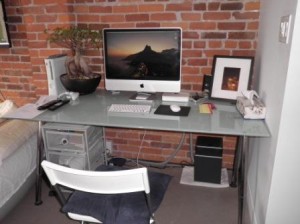Top small business ideas – when starting up your own business from home
1. Find a quiet work space
Whatever you are doing from home usually requires quiet time to focus and concentrate. So the room you select should be the quietest or most remote space on your property. It should also be a dedicated space. An office by day and a bedroom by night won’t work for very long.
2. Consider your fit out
The fit out of your home office space will largely depend on the nature of your business and whether you will be meeting clients there? I work from home but have a purpose built separate office at the back of the house. It is good enough to receive visitors but I rarely invite people there, preferring to meet at a local coffee shop. I find that coffee shops are generally warm and inviting and certainly more congenial and more relaxing for clients.
3. Hire local facilities
For those bigger ‘meeting & greeting’ occasions, check your local area for meeting rooms, conference and catering facilities. Generally these facilities are used so rarely, it is cheaper to rent by the hour or day, even for office based businesses.
4. Shut out distractions
You must find ways to make a definite and solid transition from home to work. It is important to minimise distractions. This is not easy with children and a television. Going to work in your pyjamas is a not the way to get yourself into a good head space for work. Tripping up and down the stairs to and from the refrigerator every 15 minutes is also something to avoid. I make the transition by getting dressed for work, leaving the house via the back door and arriving at my dedicated office about five seconds and six steps later.
5. Check with Council
Whether you can operate legally from your home depends where you live. Every local Council has its own view on what they will allow by way of a home business. Some encourage home businesses while others are very strict. The most common considerations include traffic, parking, unsightliness, noise and signage. It is important that you check the rules in your area with your local Council.
Here is an extraordinary example:
The guy who lived next door to me a few years ago bought a new house and moved away but retained the house next door as his work premises. He was an accountant. The one or two visitors he had on any day parked comfortably on his large driveway and he had a very small sign by his letterbox, the purpose of which was to let clients know they were at the right address. He was the quietest neighbour I have ever had, until one day a rival accountant who lived down the road but had offices elsewhere, dobbed him into the Local Council. His business was shut down. He sold the house and moved his business to commercial premises.
6. Tax considerations
A frequently asked question when starting up your own business is whether you can claim all or part of your home office expenses as a tax deduction. You should check with your accountant because there are a number of rules surrounding this area. One of the downsides to claiming home business expenses in Australia is that the extent to which you use your home as an income producing premises, you ultimately sacrifice part of your ‘principal place of residence’ capital gains tax exemption when it comes time to sell your home.
These top small business ideas are brought to by http://www.garyweigh.com
Until next time!
Gary

